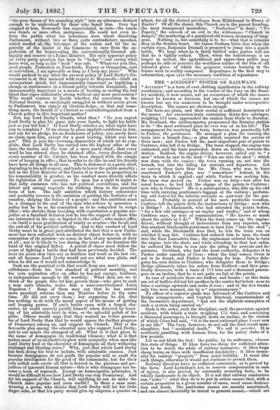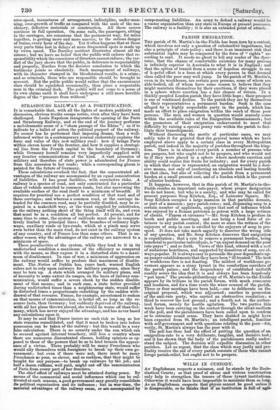TJiJ" ACCIDENT " SYSTEM ON RAILWAYS.
" ACCIDENT " is a term of ever shifting signification in the railway vocabulary; and according to the verdict of the Jury on the Burn- ley accident, it now means, not an occurrence of which the causes cannot be known or foreseen, but one of which the causes are known but are too numerous to be brought under retrospective description. The causes are obvious enough. The facts are plain, and their recital is sufficient description of the causes. An excursion-train containing thirty-five carriages, weighing 175 tons, approached the station from Goole to Burnley. Mr. Gowland, the station-master, pronounced the Burnley station to be "the most awkward place he ever was at in his life." The arrangement for receiving the train, however, was practically left to Parker, the pointsman. He arranged a plan for turning the train into a branch line,—a plan which- required the service of three men; and Parker left the most important pair of points to Crabtree, who left it to Bridge. The train stopped, the engine was unhooked, and the train proceeded, down an incline towards the station. Redford, the engine-driver, however, called out to "a man" whom he saw in the dark "Turn me into the shed " ; which was done with the engine; the train running on, not into the branch, but into the siding for arrivals and departures. Let us survey these facts thus far. Mr. Cross, who was to have sanctioned Parker's plan, was " somewhere " behind, in the train to which it applied ; and while Parker was seeking him, the train was moved on. Parker was on duty—but after his usual hours ; he had left the charge of the points to Crabtree : now who is Crabtree ? He is a calico-printer, who fills up his odd time with carrying gentlemen's luggage at the railway; perform- ing odd duties for the inferior servants as quit-rent for the per- mission. Probably in pursuit of his more profitable vocation, Crabtree left the points with the instructions to Bridge : now who is Bridge ? A blacksmith, who had attended the points before, "for a few odd carriages or an engine and tender," and of whom Crabtree says, by way of commendation "He knows as much about the points as I do." When the train comes up, the engine- driver, without thought of instructions from any superior, asks this amateur blacksmith-pointsman to turn him "into the shed " ; and, while the blacksmith does that, he lets the train run on whither it may list. Crabtree had ordered him to turn the train into the East Lancashire line ; the engineman ordered him to turn the engine into the shed; and while attending to that last order, he suffered the train to run into the siding for arrivals and de- partures. Gowland, who had the local authority, delegates it to Parker under sanction of Cross : when the time comes, Cross is not to be found, and Parker is hunting for him. Parker dele- gates his own duties to Crabtree who delegates them to Bridge ; Bridge ultimately takes his orders from Redford—and then prac- tically discovers with a train of 175 tons and a thousand passen- gers on an incline, that he is not quite an fait at the points. In case of accidents there are buffers and breaks : on this train one set of buffers did not hit another in the centre but below, so as to force a carriage upwards and make it rear ; and of the five breaks only two were manned, one by a" supernumerary."
No officer of a superior grade was informed of the Crabtree and Bridge arrangements; and Captain Binstead, superintendent of the locomotive department, "had not the slightest conception of such a system being carried on."
Such is the order, such the discipline, such the provision against accident, with which a train weighing 176 tons, and containing a thousand passengers, is brought down an incline, to the station of which Cross had said, "it is the most awkward place lever saw in my life." The jury, however, do not call the fatal result man- slaughter, but "accidental death." We call it murder. It is recklessly gambling with human lives, for the paltry stake of a few pounds. Let us not blink the fact : the public, by its sufferance, chooses this state of things. It likes fares too cheap for sufficient atten- tion to be worth the while of railway managers; it likes huge cheap trains on lines with insufficient machinery ; it likes immu- nity for railway "property" from penal liability. It must like such things, otherwise it would not continue to permit them. Railway directors have no sufficient conscience, as is proved by the facts. Lord Lyttelton's Act, to recover compensation in case of injury, is also proved, by constantly recurring facts, to be wholly inadequate to its object. It is not that railway conductors run " risks " : what they do is to put in action causes that, with a certain proportion in a given number of cases, must cause destruc- tion and death. The particular causes are usually ascertained, and can almost invariably be traced to general causes,—which are over-speed, inexactness of arrangement, indiscipline, under-man- ning, over-growth of traffic as compared with the scale of the ma- chinery, defective materials or construction. All these causes continue in full operation. On some rails, the passengers' sitting in the carriages, are conscious that the permanent way, for miles together' is getting more and more uneven to the serious danger of trains, every hour of the day. Yet it often happens that at those very parts time lost in delay's at more frequented spots is made up by extra speed. The Blumley accident illustrates almost all the causes ; but we have no belief that the public will enforce that re- sponsibilitywhich the conscience of directors cannotenforce ; the ver- dict of the jury shows that the public, in deference to respectability and property, flinches from the decisive conclusion to which the testimony points so absolutely. Such management of railways, with its character stamped in its bloodstained results, is a crime ; and as criminals, those who are responsible should be brought to account. But the polite public would rather that the excursionist class should be squelched occasionally, than place a respectable man in the criminal dock. The public will not come to a sense of its own claims until it shall have undergone a still more horrible degree of the "pressure from without."



























 Previous page
Previous page